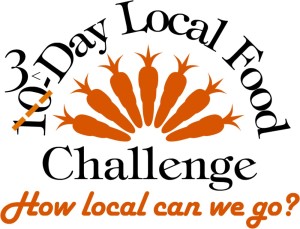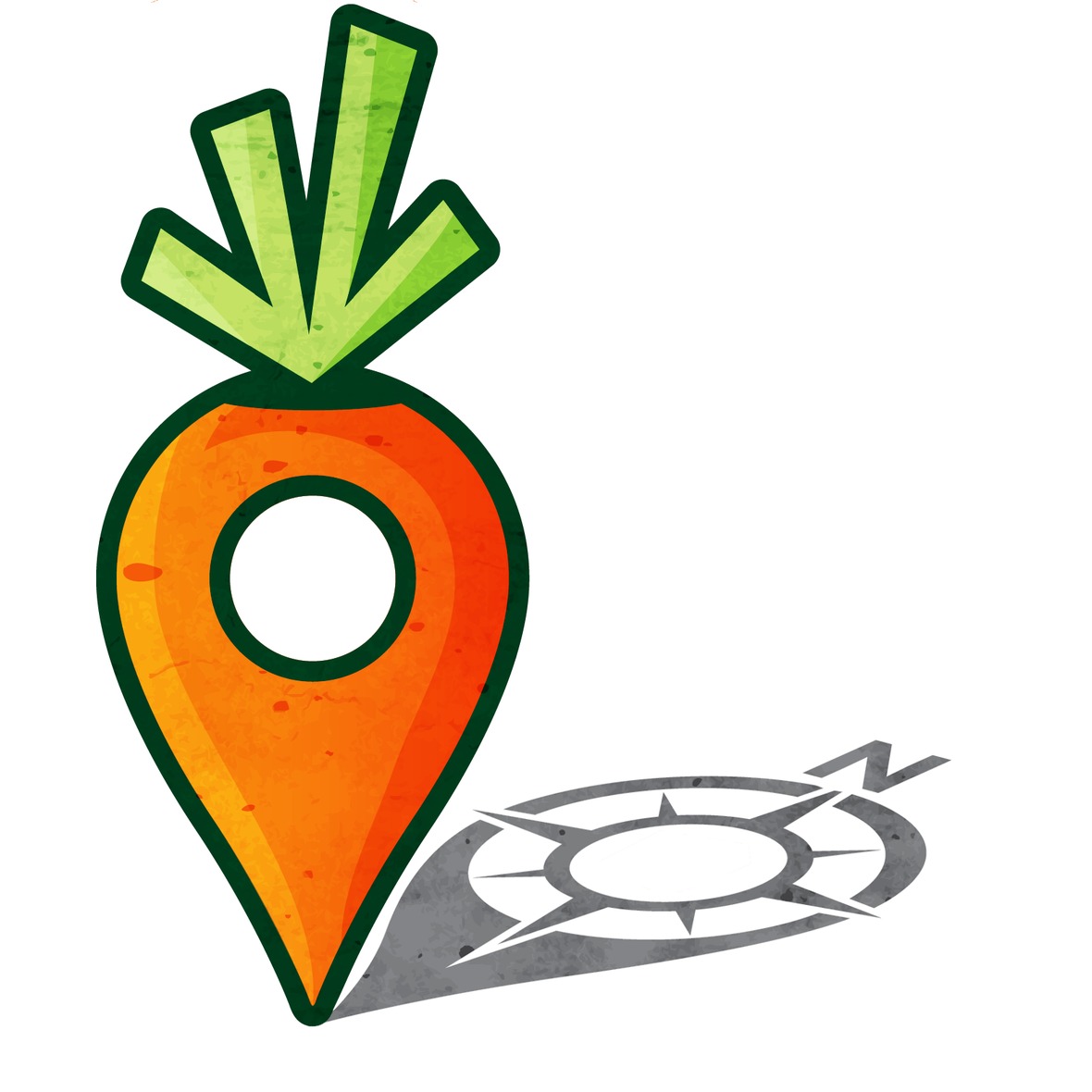For busy people: a 3-Day Local Food Challenge!
Newsletter just sent! Here’s the gist:
 The 10-Day Local Food Challenge is rounding the 2 week bend. Nearly 100 people are in. I’d say both feet, but that’s an odd image for food. So is “up to their eyeballs”.
The 10-Day Local Food Challenge is rounding the 2 week bend. Nearly 100 people are in. I’d say both feet, but that’s an odd image for food. So is “up to their eyeballs”.
Let’s just say we’re all waking up and smelling the coffee (if that is one of the exotics) about how challenging it is to eat from your region. Scroll down for highlights from this week’s juicy conversations.
I want you to have some of this fun.
You’re invited be a weekend “local food warrior.” Pick 2-3 days, any time (not just a weekend!) for a 7 meal/100 mile/10 exotic challenge.
Seven meals. Not hard, right? Pretty easy to find eggs, onions, potatoes, honey, greens, garlic, squash most places. With a little more work you can find milk, cheese and some kind of meat. Or if you are vegan, grain and beans. One Challenger got 10 pounds of local… alligator… for $10.
Add exotics. For most that includes coffee, spices, salt and oil. Since you get 10 (and it’s only 7 meals) you have plenty more room for treats.
Join the Facebook Group to join the conversation
Or if you don’t like Facebook, comment on the Blog and sign up for the updates
Serious FunBy taking the 7-meal challenge, you will join us in this experiential research project. Until you do it, you’ll think things like: Or you’ll think… Be a pioneer. Join this first challenge. Join us in discovering what makes our local food economies weak and local eaters unable to step up – and where the leverage points are for change. If you think “we eat this way already” I’d like to challenge you to sign up anyway. Bring your voice to the conversation here. Serious fun means engaging in serious issues in a spirit of play. Not triviality, but the kind of presence and abandon you bring to hobbies, sport, parties and love. |
Here are those snippets from our conversations on Facebook. You can join the group and just listen in, but I – and we – all hope you will do the 3-Day Local Food Challenge and tell us where you are, what you’re eating and your adventures along the country roads of our food system.
Jan Deligans
So here’s some things I’m learning –
Even the co-ops aren’t labeling their products as to the locality they come from in a coherent enough way […] Many products don’t identify where they come from at all. Even those that do you may not be able to figure it out. […] I thought my area had an abundance of local food but actually they are very limited to just produce and eggs and not much else.
Annabel Ascher
Here in Sonoma County we have a large chicken company that produces the Rocky chickens, and also Rosie chickens which are organic. The thing is, this is pretty darn close to a factory farming operation even if it is organic. So, what do we do with a food that is LOCAL in miles, and possibly organic, but is also a factory operation distributing state-wide or nationally? It doesn’t feel right to me.
Cris Cantin
Here in the Upper Midwest, there’s lots and lots of food production going on…but most of it is processed and trucked out to other regions. To find local foods, I’m finding you really need to track down a direct source (farmer/fisherman/etc) and make a personal connection, OR talk a small store in a rural location into carrying a few local goods like seasonal produce in limited quantity. The regulations in place restricting access to local foods is astounding to me! Everything has to be processed, packaged, sealed, shipped through a big supplier, which is just nuts.
Susan Cunningham
Making Chocolate Chili with local beef, farm-stand hot peppers and onions, and homegrown garlic and oregano. But when I get to the spices, I realize that without exotics this would be a very different meal, and that using only locally-sourced foods is precisely where regional cuisines come from. Sounds stupid to say it out loud, but it’s something I think we rarely think about anymore, because we simply don’t have to. We can get pretty much anything from anywhere at any time, especially if we live in/near a major port city, as I do.
Jan Deligans
They added the word “native” to “local”. It did make me think about the strange and full satisfaction I always get when I eat my homegrown and homemade red cabbage saurkraut – definitely one of my “native” foods from my ancestor’s Germany. So I guess my point is that during the next 10 days I will eat only local foods. But during that time I’ll evaluate if these foods are the healthiest I can get (non-GMO and low or no pesticide residues) and also do they match what my body probably needs which is the heritage foods of my ancestral line. This is of course a lot to ask but I am seriously questioning the health of my foods as well as the promoting of the local economy. Can we do both? I hope so.
Cindy Blackshear
One of my take aways from this challenge is the difficulty of eating local when eating out. I haven’t set foot in a fast food restaurant in years and frequent local places but where IS that food coming from?? I know of only one restaurant in my area that really touts serving local food and we’re a mainly rural county! And how do we ask without seeming to put someone down?
Sarai Stevens
Local food on a budget… try hosting a food swap.
I hosted a Food Swap on Saturday as a special event for the rural farmers market I helped to created five years ago. […] Eating locally, the market, my garden, the food my husband and I cook and preserve, the informal community economic network we have connected and amplified…it all feeds into a way of life that makes me quite happy and rich.
Anne Bromwell
One of my reasons for joining this challenge is to discover exactly how many “exotics” I really use on a regular basis and determine which ones I would rather not live without. I can’t remember a time in my life when I’ve not had bananas available. Yet, I’ve never lived in the tropics where they are grown. And I enjoy them so I hope to be able to continue eating them so they are at the top of my exotics list. As I reach for ingredients to add to my daily cooking, I am much more conscious of WHERE it came from and how far it traveled. Then I can decide how important that ingredient is to my overall palate and also discover a suitable local substitute if there is one.
~~~~~
Please join us:
Sign up here
Read and comment on the blog
Join the Group
And even if it’s just for a 3-day challenge, take the survey so you are in the research group

No comments